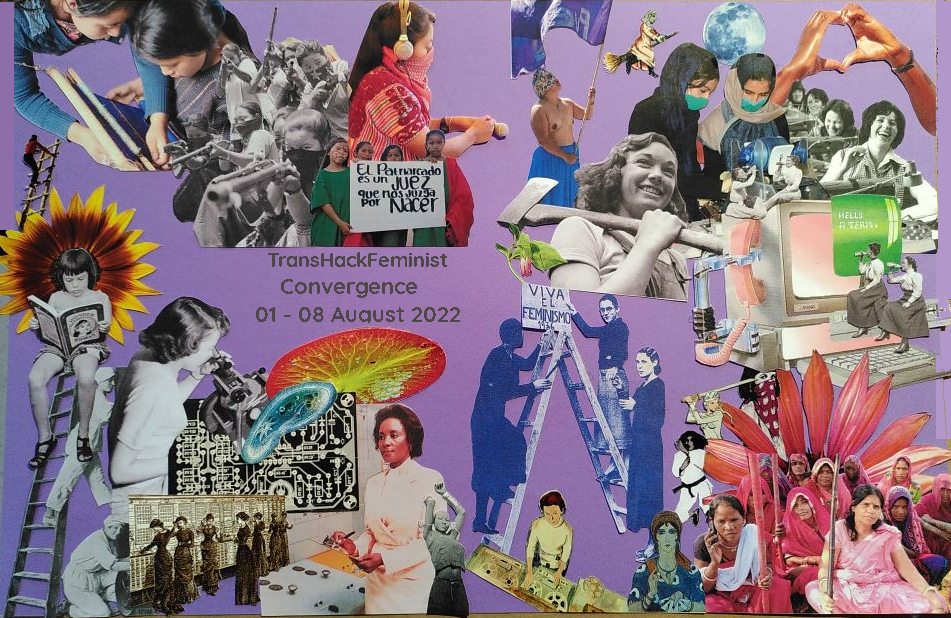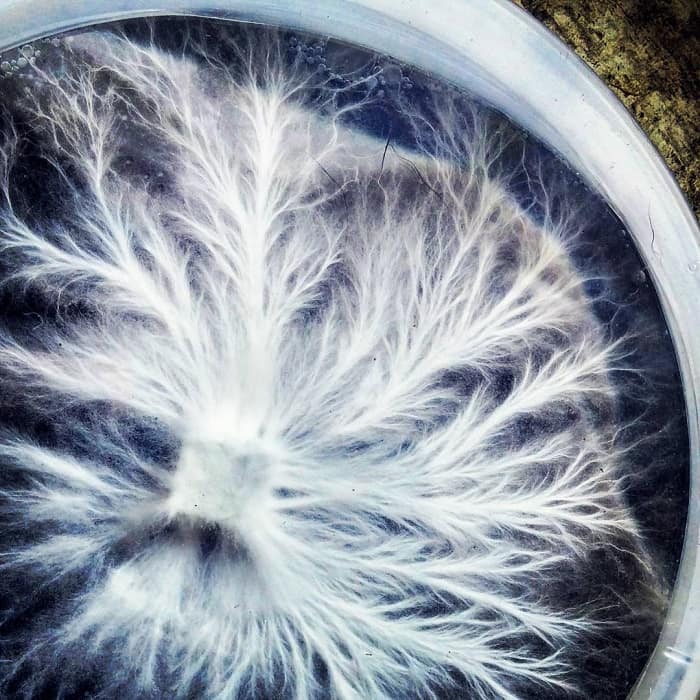break the petri_hyphas spread es un taller de transfers y reproducción experimental de micelios*: la idea es romper con los protocolos asépticos propios del cultivo en laboratorio para ensayar técnicas experimentales de cultivo y reproducción de organismos mutantes**.
BTP_HS es una propuesta para repensar los entornos (y las relaciones) de las prácticas de cultivo a partir de las necesidades y deseidades de lxs hongos (pero también de lxs otrxs microorganismos que lxs acompañanan). A tal próposito, experimentaremos con recetas de sustratos (alimento) y con el diseño de contenedores que puedan reproducir las condiciones de crecimiento fuera de las dimensiones normativas de la petri dish. La práctica nos servirá también como starter para especular sobre las relaciones interespecie que construímos con nuestros cultivos, y todxs sus acompañantes, desde una perspectiva menos antropocentrica e instrumentalizadora.
este no es un taller de cultivo. aún así, como se puede intuir desde el subtitulo, está vinculado con las prácticas de difundir, compartir y cultivar micelios de hongos. por eso, si hay deseo, podemos encontrar un momento al final del taller para compartir placas miceliadas para empezar cultivos de hongos.
Laboratorio, dos dias, dos horas
*micelios de hongos, pero también sus acompañantes (bacterias, otros hongos, ácaros, etc.)
**mutantes en cuanto capaces de adaptarse a nuevas y distintas condiciones de vida.
Idioma: Castellano
Documentación nodo
Notes:
mart/ welcomes and show she is here with her companions. she shows a petridish and ask the participants to introduce themselves.
dem/ introduced in pirate mushroom workshops in kitchen
lu / is marts neighbour /
microdosing.
a/ likes experimenting with musrooms and labs… culinary
https://wiki.calafou.org/index.php/File:Zinpage1.JPG
b/ in love with mushrooms, grow and takes care.
mi/ experimenting + micro doser and has mushrooms for the community – artistic /scientific mushroom
cl/ explores plants – vegetables relationship with body ( digestion, perceiving different realities)
mel/
lul / perceives the growing interest in mycellium + mushroom
mycology as a queer discipline. [ Patricia Kaishian]
mal / grows mushrooms herself for neurogenerative processes. mushroomcoffee mix : chocolate, tumeric + mushrooms. to focus. also interested in kefir ( yeast + bacteria – maybe it is not a mushroom ?)
questions: can you grow mushrooms in a lab ?
m:: _ discuss;; boundaries between a closed system and open system. reproduction of conditions in artificial ways.
kalam: autonomous biohacker space in montpellier.
efficiency tests – grow (kombucha, pleurots, bacteriaphage – subsititute to antibiotics) e.g acne / cure + make objects.
also interested in fermentation.
https://lebib.org/wiki/doku.php?id=labase:debut
p/ has taken some mushrooms – poetic drugs instead of ‘utility’ it enhances creative process?
na/ – lot of experiments with mushrooms but not preservance and reads about it
kl/ – loves mushrooms and wants to learn how to take care + grow them. she tested but there was a lot of mold.
andr/ – is curious
ana/ – radicality of mushrooms – and how they can grow on our shit and corpses and feel tranquility in whatis left behind
mart/ – – was in calafou when she first encountered
and experienced growing together from this ground. psycoedelic self-autonomy / alimentary sovereignty (brain, spirit, …) she interested in the dimension of when the organic expands and connects with other layers.
part of a network mme – (wiki is down)
activiation and desactiviation in asynchronic temporatiliteies /realities. what is not is seen, doesn’t dissappear, it is still there. their are also part of life cycles. makes live possible.
mycology + art : installation on imagining *****
permutation of matter/
micro +macrodose experience : direct access/ proximity.
fanzine.
conversation /space to think practices
mushroom cultivation >> to eat
mushroom + art >>>>> my practice with other living beings. am i using them ( instumentalization), exploiting on something that is alive? it also has necessities + conditions. how to have an ethical position. anthropocentric?
q/ others is a very recurrent word. what are these others? other beings.. ??
bank of myccelium was stored in the fridge and it was eaten. some dustmites ate the mycellium. we found out by using the microscopes.
why do we thing with mushrooms ? useful to relate to the community not to capitalize. strategy : how non useful human interaction can be.
ana/ refelection on methods – on how to interact with corn, vegetables,… on how our ancestors where relating to plants, .. (before the genocide)
other article on corn ::
stefano mancuso / https://wikitia.com/wiki/Stefano_Mancuso
malena: how to break boundaries between me and the organism (gloves, antispetic …) and was interested in how it affects her body ( ph, smell, …) . why make it grow ? some don’t eat/drink but use the drying process as an omen.
questioning ‘contamination’
considering what are the power dynamics and how to deconstruct.
{ read together } – 15 min.
part of workshop : breaking the petri dishes – a possible environment and space in which the mushrooms could thrive and be happy.
1 station : petridish + tools
1 station: microsopes
1 station of pressure cookers to sterilize + camping gaz – heat convention spaces + grinder
*** AGAR – base > microlandscapes.
make recepies
qe do not want to get involved in eugenetics !
lucia – temporalities of sterilizing. how time gets to slowed down and how to enter a sterilize a fictional environment.
(and also materiality, energy costs are involved)
na/ introduces : the fear – which comes with ‘observing’ environments in which we want to ‘control’ and how this paradigm is influencing our vocabulary .
lu/: we are discussing isolation but in relation in what happened this morning — dicussions on mixity – non-mixity.
we also have to try to adress these discussions ‘within mycellium’
in relation wit our social practices in our feminist practices
proposal :
how far we can go in deconstruction in environmental conditions ?
possible environement or space in which things could appear? speculate on the interspecies relashionships.
scientific practices in the labs have a very eugenistic approach in killing other species.
how can we think of the temporality of sterilizing petridish, slowing down process and that is the time it gets in this sterilized fictional environements. The energy and materiality of the process. a constraint that we can engage in our processes?
the search of control in our societys, recusive in social organisation saying we are not afraid /i n relation of this morning of mixity or non mixity?
[its hard not to relate with our conversation]
deconstructing asceptic spaces in isolating one relationship and think of non mixed spaces of being filtered that (we) defend with feminist practices. how also in “non mixty” spaces we mix with our own bodies? the deconstructions we do here go back outside and shape our interactions.
a desire of a tool that can be translatable.
we can do an experiment that people are more or less emotional affects our emotions?
how far can we go in the disconstruction? leave a petri absorbed everything that is here?
how can we think of deconstruction? how do we create words from which we can start to talk outside of the language?
language is never seperated from our practices, the term contamination
what are the degrees of violence in accepting it or other survival strategies? mycellium thrives to survive and defense? accepting that you make a violence in the lab?
the ones who gives the conditions ?not only humans, or finding an autonomous ways? not necessarly conditions but with heat so some bacteria use heat to heat others?
the natural selection was the law of the stronger? (Darwin)
mushrooms in the nature you are the contamination then? laboratorys make sure that the sorcery doesn’t affect the lab.
do we have the tools at this WS to properly adresse this questions?
what are the elements we can identify to make that attention to a more autonomus practice?
3 groups:
-> Observation: We write and mix in groups to draw how we can imagine those spaces from the spaces and the petridish
->Petrihacking : Make possible recipes to start preparing them
-> Cooking

